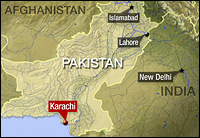Baithak Desi Jun 04: Anjum Niaz on Aitezaz's Backtracking, Kailash, NPR from Karachi, DT on Aitezaz, Tariq Butt, Kamila Shamsie, Headlines, Cartoons
It is time therefore that Mr Ahsan should realise the logic of his own stand which squarely pits him against his own party. There is absolutely nothing wrong with Mr Ahsan’s decision to plough a different furrow. He may even decide to form a new political party, one that is wedded to pushing Pakistan in the direction of constitutionalism. But by holding on to everything, he may be left holding nothing. Daily Times Editorial
The Article 45 of the current Constitution reads: "The president shall have power to grant pardon, reprieve and respite, and to remit, suspend or commute any sentence passed by any court, tribunal or other authority." After the PPP amendment, it would read: "The president shall have power to grant pardon, reprieve and respite, and to remit, suspend or commute any sentence passed by any court, tribunal or other authority or indemnify any act whatsoever." The insertion of indemnifying any act whatsoever means the president would have the powers to indemnify any action, including subversion of the Constitution, acts of high treason, suspension or abrogation of the Constitution for any period of time, an expert said. President can indemnify any act, even his own. Tariq Butt
BATRIK, Pakistan — On the northwest tip of Pakistan, bordering Afghanistan's Nuristan province, the inaccessible Chitral district has long been thought to be a possible refuge for Osama bin Laden. With the high peaks of the Hindu Kush range and its narrow valleys, it's easy to dodge through secret mountain routes between Pakistan and Afghanistan.
Chitral is also the home of the Kalasha, a unique pagan civilization that's lived in the area for 2,000 years or more, now boxed in by an increasingly militant Islam. Thinly populated, Chitral covers 5,800 square miles, with war-torn Afghanistan to the north and west and the extremist strongholds of Swat and Dir to the south.
- Graphic | Pakistan's Kalasha people

View larger image By Saeed Shah | McClatchy Newspapers

NPR.org, June 2, 2008 · By the end of this year, half the world's population will live in cities, according to the United Nations, and the proportion will only increase. The way we develop our cities may determine our collective future, living standards, culture, politics, freedom — even our survival. This is also the year that Morning Edition begins a series called "The Urban Frontier," an occasional examination of the world's cities. Series Overview: The Urban Frontier — Karachi
NEARLY a decade ago, shortly after my first novel was published in the UK, a literary critic in London talked me through the calendar as understood in publishing terms. September and October were the months for the ‘big-hitters’ in advance of the Booker Prize. November and December were all about Christmas books (that is books that work well as presents). January was a quiet month, with book-buyers trying to recover from all the Christmas spending. The spring was ideal for less commercial literary fiction. May and June was time for the summer block-busters. And July...well, July was literary death. Everyone was on holiday — the book-buyers, the literary editors, the critics, the publishers. But something must get published in July, I said. Without pausing, the critic replied: “Translations.” Crossing fingers for translations - Kamila Shamsie
Headlines
An Overview of the Proposed Constitutional Amendments by Mohammad Akram Sheikh
Barack Obama makes history, clinches Democratic nomination
Double Jeopardy: Call for Musharraf treason trialHe still doesn't: Sharif didn’t know of Kargil: Ex-general
PML-N rejects PPP’s constitutional package
Who goes to bat for Nazia? When justice takes a backseat
KARACHI: Durrani, Kamal agree to disagree
Dr Qadeer denies passing on nuclear secrets








0 Comments:
Post a Comment
<< Home